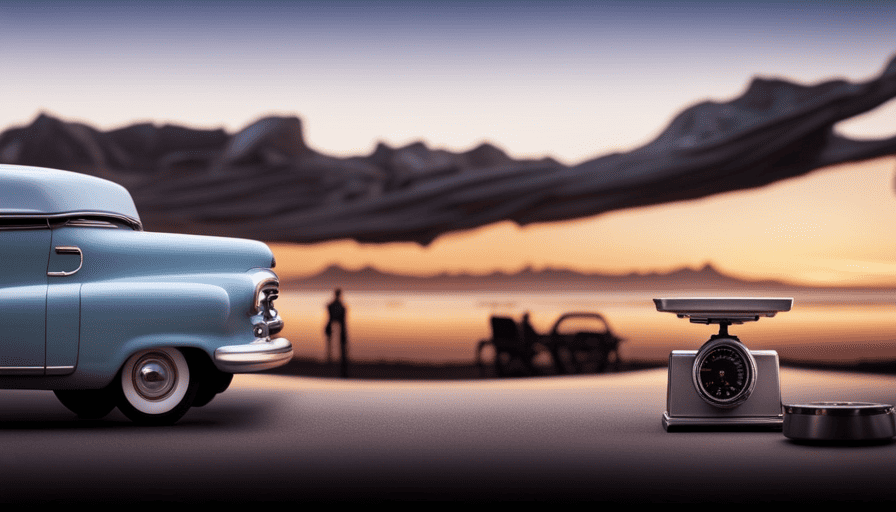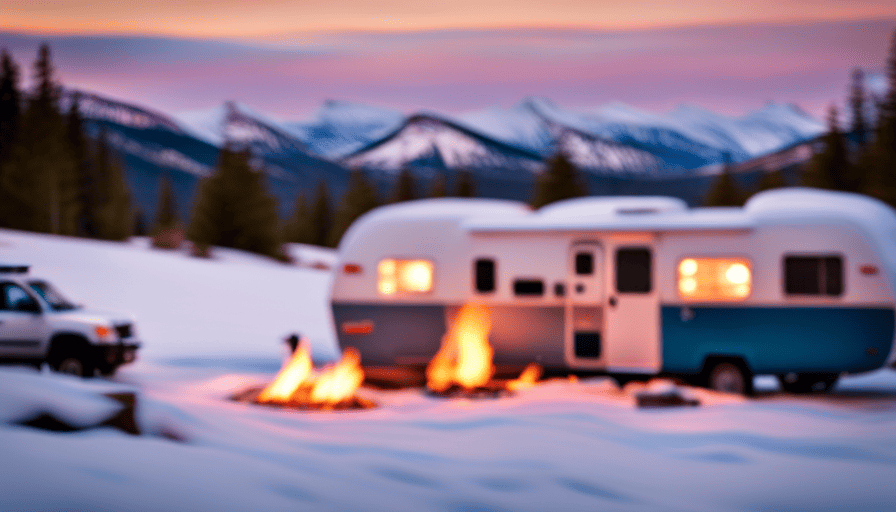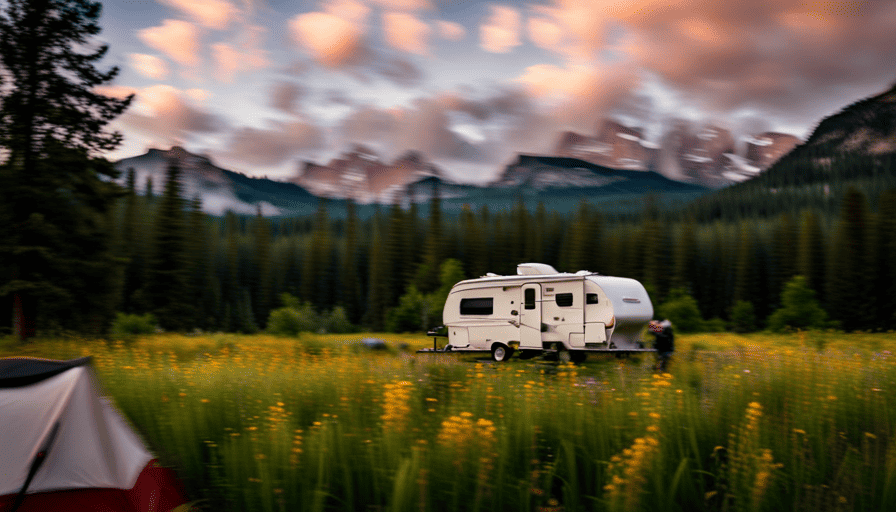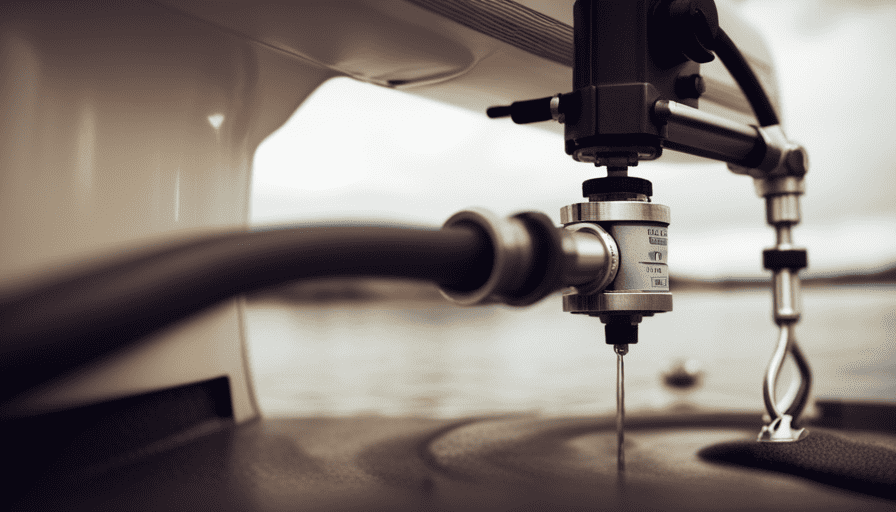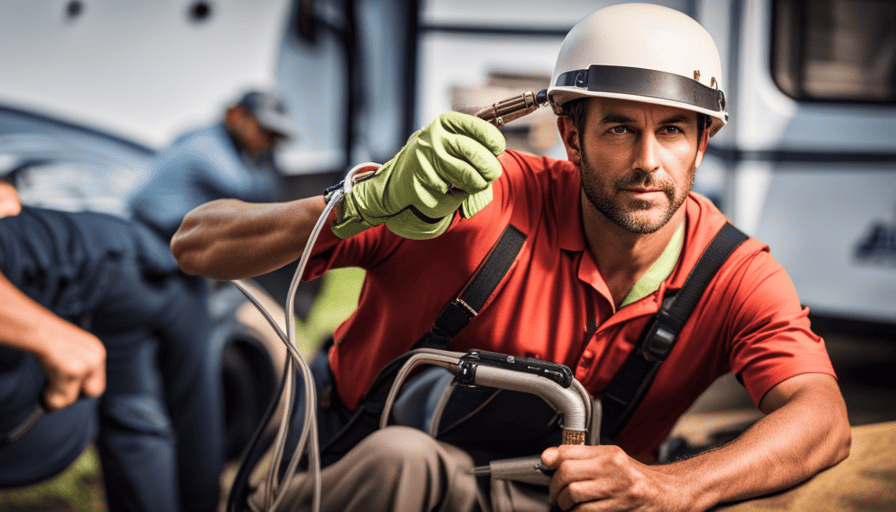If you’ve ever wondered about the weight of a pop-up camper, get ready to be amazed as I reveal the secrets behind the weight of these versatile travel trailers.
In this article, we will explore the factors that affect the weight of a popup camper, including the materials used and the size of the unit. We will also dive into the different weight categories of popup campers, from lightweight to heavyweight, and discuss the pros and cons of each.
Plus, I will share some tips on how to determine the weight of a popup camper and provide guidance on maintenance and care. Whether you’re considering renting or buying a popup camper, we will help you make an informed decision.
And if you’re looking to enhance your camping experience, we’ll also explore the world of popup camper accessories and add-ons.
So, get ready to embark on a weighty adventure as we find the perfect popup camper for your needs.
Key Takeaways
- Popup campers vary in weight depending on factors such as materials used and size.
- Lightweight popup campers weigh between 500 to 1,500 pounds and are easy to tow and maneuver.
- Midweight popup campers weigh between 1,500 to 3,000 pounds and offer more space and comfort.
- Heavyweight popup campers provide ample space, top-notch amenities, and comfort while still being easy to tow.
Factors Affecting Popup Camper Weight
Imagine yourself standing next to a popup camper, and as you look at it, you wonder how much it weighs. The weight of a popup camper can vary depending on several factors.
One of the main factors is the use of lightweight materials in its construction. Popup campers are designed to be portable and easy to tow, so manufacturers often use lightweight materials such as aluminum and fiberglass to keep the weight down. These materials not only reduce the overall weight of the camper but also make it more fuel-efficient when being towed. By using lightweight materials, the camper puts less strain on the towing vehicle, resulting in better fuel efficiency. This is especially important for long trips where fuel costs can add up.
Additionally, the lighter weight of the camper makes it easier to maneuver and park in tight spaces.
As we move on to the next section about lightweight popup campers, you will discover more about the advantages they offer.
Lightweight Popup Campers
If you’re looking for a lightweight option, you’ll be amazed at how little an ultralight pop up camper can tip the scales. These compact popup campers are designed to be as lightweight as possible, making them easy to tow and maneuver. Typically weighing between 500 to 1,500 pounds, these campers are perfect for those who have smaller vehicles or prefer a more nimble camping experience.
Ultralight pop up campers are constructed using lightweight materials such as aluminum or fiberglass. This not only reduces the overall weight but also increases fuel efficiency when towing. Despite their lightweight design, these campers still offer a comfortable camping experience. They usually feature a small kitchenette, sleeping area, and compact bathroom facilities.
The advantage of an ultralight pop up camper is that it allows you to go off-road and explore areas that may be inaccessible to larger RVs. You can easily set up camp in remote locations and enjoy the beauty of nature without sacrificing comfort.
Transitioning into the next section about ‘midweight popup campers’, you’ll find that they offer a slightly larger and more spacious camping experience without being too heavy.
Midweight Popup Campers
When you’re ready for a camper that offers a bit more space and comfort, but still keeps things light and easy to tow, look no further than the midweight pop up camper – it’s the perfect balance between convenience and mobility.
Midweight popup campers are a popular choice for those who want a camper that is not too heavy, but still provides enough room for a comfortable camping experience. These campers typically weigh between 1,500 to 3,000 pounds, making them lighter than their heavyweight counterparts, but still offering more space than lightweight options.
Here are some of the best midweight popup campers available in the market:
| Brand | Weight (lbs) | Features |
|---|---|---|
| Jayco | 1,800 | Spacious interior, durable build |
| Forest River | 2,200 | Easy setup, ample storage |
| Coachmen | 2,500 | Comfortable sleeping arrangements |
| Starcraft | 2,800 | Versatile floorplans, quality design |
| Aliner | 3,000 | Lightweight construction, easy towing |
These midweight popup campers provide a great balance between weight and functionality, allowing you to enjoy your camping trips without sacrificing comfort. With various brands and models available, you can choose the one that suits your needs and preferences best.
In the next section, we will explore heavyweight popup campers and their features, providing you with options for campers that offer even more space and amenities.
Heavyweight Popup Campers
Get ready to experience the ultimate in camping luxury with heavyweight popup campers that offer spacious interiors, top-notch amenities, and the perfect blend of comfort and mobility. These heavyweights are designed to provide you with all the comforts of home while still being easy to tow and set up. Here are three reasons why heavyweight popup campers are worth considering:
-
Ample Space: With their larger size and expanded floor plans, heavyweight popup campers offer plenty of room for you and your family to spread out and relax. You’ll have ample space for sleeping, dining, and lounging, making your camping experience more enjoyable.
-
Top-Notch Amenities: Heavyweight popup campers come equipped with top-of-the-line amenities, including fully-equipped kitchens, luxurious bathrooms, and comfortable sleeping areas. You’ll have everything you need to cook meals, take hot showers, and get a good night’s sleep, ensuring that you can enjoy all the comforts of home while on the road.
-
Comfort and Mobility: Despite their larger size, heavyweight popup campers are still relatively easy to tow and maneuver. Many models are designed to be lightweight and aerodynamic, making them more fuel-efficient and easier to handle on the road.
When considering a heavyweight popup camper, it’s important to keep in mind weight limits for towing. This will ensure that your vehicle can safely handle the heaviest popup campers on the market. Transitioning into the subsequent section about how to determine the weight of a popup camper, it’s crucial to understand the weight of the camper you plan to tow in order to make informed decisions.
How to Determine the Weight of a Popup Camper
Discover the simple steps to calculate the weight of your pop-up palace for a hassle-free towing experience. Determining the weight of a popup camper is essential to ensure that you’re within the towing capacity of your vehicle and to prevent any potential safety hazards on the road.
To determine the weight, you’ll need to measure the dimensions of your camper. Start by measuring the length, width, and height of the camper when it’s in its closed position. Next, you’ll need to measure the length, width, and height of the camper when it’s fully opened. These measurements will help you calculate the weight using a weight calculator or by referring to the manufacturer’s specifications.
Remember to include the weight of any additional accessories or gear that you plan to carry in the camper.
Once you’ve determined the weight of your popup camper, you can move on to the next section to learn some valuable tips for towing it safely and efficiently.
Tips for Towing a Popup Camper
When it comes to towing a popup camper, there are a few key points to keep in mind. First and foremost, it’s important to choose the right vehicle for the job.
Ensuring proper weight distribution is also crucial, as it can greatly affect the stability and control of your towing setup.
Lastly, practicing safe towing practices, such as maintaining a safe speed and regularly checking your equipment, is essential for a smooth and secure journey.
Choosing the Right Vehicle
Opt for a vehicle that suits your needs perfectly when choosing the right vehicle for your popup camper. Consider the pros and cons of different vehicle types to make an informed decision. Here is a list of factors to consider:
-
Size and weight capacity: Ensure that the vehicle has enough towing capacity to handle the weight of your popup camper.
-
Engine power: A vehicle with a powerful engine will make towing easier, especially when going uphill or in adverse weather conditions.
-
Fuel efficiency: Consider the fuel efficiency of the vehicle, as towing a popup camper can increase fuel consumption.
-
Maneuverability: Choose a vehicle that is easy to maneuver, especially when navigating tight spaces or parking.
By carefully considering these factors, you can choose a vehicle that’s well-suited for towing your popup camper. Ensuring proper weight distribution is crucial for a safe and comfortable towing experience.
Ensuring Proper Weight Distribution
Achieving proper weight distribution in your vehicle is like finding the perfect balance in a delicate dance, ensuring a smooth and stable towing experience for your popup camper. To ensure proper weight distribution, there are a few key tips to keep in mind.
First, make sure to distribute the weight evenly between the front and back of the vehicle. This can be achieved by placing heavier items closer to the axle and keeping lighter items towards the front or back.
Additionally, it’s important to avoid overloading your vehicle beyond its maximum weight capacity. Common weight distribution issues include having too much weight at the rear, which can cause swaying and instability, or having too much weight at the front, which can negatively impact steering and braking.
By following these weight distribution tips, you can ensure a safer and more enjoyable towing experience.
Moving on to safe towing practices, it’s important to…
Safe Towing Practices
To ensure a smooth and secure towing experience, it’s crucial that you follow safe towing practices. Here are some key techniques to keep in mind:
-
Properly distribute the weight: Make sure that the weight of your popup camper is evenly distributed to prevent any imbalance that could lead to trailer sway. This can be achieved by properly loading your camper and using a weight distribution hitch if necessary.
-
Check your trailer sway control: Install a trailer sway control system to help minimize any potential swaying of the camper while towing. This can greatly enhance the stability of your setup and make your towing experience safer.
-
Maintain a safe speed: It’s important to drive at a safe and reasonable speed while towing your camper. Excessive speed can increase the risk of trailer sway and compromise your control over the vehicle.
By following these safe towing techniques and ensuring proper weight distribution, you can enjoy a secure and stress-free towing experience.
Now, let’s move on to discussing the maintenance and care for a popup camper.
Maintenance and Care for a Popup Camper
Don’t forget to regularly inspect the roof of your popup camper to ensure it’s in tip-top shape and ready for your next adventure. Popup camper maintenance is crucial to keep your camper in good condition and prevent any common issues that may arise.
One of the most important aspects of maintenance is checking the roof for any signs of leaks or damage. This can be done by visually inspecting the roof and feeling for any soft spots or bulges. It’s also a good idea to clean the roof regularly to remove any dirt or debris that could cause damage.
In addition to roof maintenance, there are other areas of your popup camper that should be regularly checked. This includes the tires, brakes, electrical system, and propane system. Checking the tires for proper inflation and any signs of wear is important for safe towing. The brakes should be inspected to ensure they’re working properly, and the electrical and propane systems should be checked for any issues or leaks.
Maintaining your popup camper is essential for a safe and enjoyable camping experience. By regularly inspecting and maintaining your camper, you can prevent common issues and ensure that it’s always ready for your next adventure.
Now let’s dive into the next section about renting vs. buying a popup camper.
Renting vs. Buying a Popup Camper
When considering whether to rent or buy a popup camper, there are several factors to consider. Renting a popup camper allows for flexibility and the ability to try out different models before making a commitment. However, buying a popup camper provides the benefit of ownership and the ability to customize and personalize the camper to your liking. Ultimately, the decision to rent or buy will depend on individual preferences and circumstances.
Pros and Cons of Renting
Renting a popup camper has its advantages and disadvantages, so let’s explore the pros and cons together.
Here are four key points to consider when comparing renting vs. owning a popup camper:
-
Flexibility: Renting allows you to enjoy the camping experience without the long-term commitment. You can choose different models and sizes based on your needs and preferences.
-
Cost: Renting a popup camper is generally more cost-effective, especially if you only go camping occasionally. You don’t have to worry about maintenance, storage, or insurance costs.
-
Convenience: Renting eliminates the hassle of storing and maintaining a popup camper. You don’t have to worry about repairs, cleaning, or finding a place to store the camper when not in use.
-
Limited customization: Renting a popup camper means you have limited options for personalization. You may not be able to equip it with all the features and amenities you desire.
Considering these points, it’s important to weigh the pros and cons before making a decision.
Now, let’s delve into the advantages and disadvantages of buying a popup camper.
Pros and Cons of Buying
If you’re considering purchasing a popup camper, you’ll discover a whole new level of freedom and adventure awaits you. When it comes to buying, there are a few important considerations to keep in mind.
First, think about your budget and what you’re willing to spend. Popup campers can vary in price, so it’s important to set a realistic budget that meets your needs.
Another factor to consider is the resale value. While popup campers do depreciate over time, some models hold their value better than others. Researching the resale value of different brands and models can help you make a more informed decision.
Additionally, think about your camping needs and preferences. Do you need a smaller, lightweight camper or a larger one with more amenities? These factors will help you narrow down your options.
Thinking about buying a popup camper? Let’s now explore the various accessories and add-ons you can consider for your new adventure.
Popup Camper Accessories and Add-ons
Accessorize your popup camper with lightweight add-ons to enhance your camping experience. Here are three must-have popup camper accessories that’ll make your camping trips more convenient and enjoyable:
-
Popup Camper Storage Solutions: Maximize the space in your popup camper with innovative storage solutions. Look for collapsible storage containers, hanging organizers, and under-bed storage compartments. These accessories will help you keep your camping gear organized and easily accessible, allowing you to make the most of your limited space.
-
Outdoor Kitchen Set: Turn your popup camper into a mobile kitchen with an outdoor kitchen set. These sets typically include a portable stove, cookware, and utensils designed specifically for camping. Cooking outdoors will bring a whole new level of enjoyment to your camping experience, allowing you to prepare delicious meals while enjoying the fresh air.
-
Portable Solar Panels: Stay powered up even in remote camping locations with portable solar panels. These lightweight panels can be easily set up to harness solar energy and charge your electronic devices, like smartphones and laptops. With portable solar panels, you won’t have to worry about running out of battery or finding a power source during your camping trips.
Accessorizing your popup camper with these lightweight add-ons will elevate your camping experience. In the next section, we’ll discuss finding the perfect popup camper for your needs.
Conclusion: Finding the Perfect Popup Camper for Your Needs
Once you’ve explored all the options and considered your camping needs, you’ll be ready to embark on your search for the perfect popup camper that perfectly accommodates your outdoor adventures.
Finding the ideal size is crucial to ensure that your popup camper fits your needs and provides enough space for you and your fellow campers. Whether you’re looking for a cozy camper for solo adventures or a spacious one for family trips, there are various sizes available to choose from.
When it comes to setting up and taking down a popup camper, it’s essential to consider the ease and convenience of the process. Look for a camper that offers a simple and straightforward setup, with clear instructions and user-friendly features. This will make your camping experience more enjoyable and stress-free, especially if you’re a beginner.
Additionally, consider the weight of the popup camper you’re interested in. Some campers are lighter and easier to tow, while others may require a larger vehicle or additional equipment. It’s crucial to ensure that your towing vehicle is capable of safely pulling the weight of the camper you choose.
By considering these factors, you can find the perfect popup camper that meets all your camping needs. So, start your search and get ready for unforgettable outdoor adventures!
Frequently Asked Questions
Are there any weight restrictions when towing a popup camper?
Weight restrictions for towing pop-up campers are an important consideration to ensure safe and smooth travel. When choosing the right towing vehicle, factors such as the camper’s weight, tongue weight, and the vehicle’s towing capacity should be taken into account.
It’s crucial to adhere to the manufacturer’s guidelines and not exceed the vehicle’s recommended towing capacity. This will help maintain stability, control, and avoid potential damage to both the camper and the towing vehicle.
Can the weight of a popup camper affect the fuel efficiency of the towing vehicle?
Oh boy, let me tell you, the weight of a popup camper can seriously impact the fuel efficiency of your towing vehicle. It’s like dragging a mountain behind you!
The more weight you add, the more fuel you consume. It’s a simple equation, really.
So, if you’re worried about fuel consumption and want to maximize your towing capacity, make sure to consider the weight of the popup camper you’re hauling.
How does the weight of a popup camper affect its stability and maneuverability while towing?
The weight of a popup camper can significantly impact its stability and maneuverability while being towed. Heavier campers can be more difficult to control and may sway or fishtail more easily, especially at higher speeds or in windy conditions. This can make towing more challenging and potentially increase the risk of accidents.
Additionally, the weight of the camper can also affect the fuel efficiency of the towing vehicle, as a heavier load requires more power and fuel to move.
Are there any safety considerations to keep in mind when towing a popup camper of a certain weight?
When towing a popup camper, there are important safety precautions to consider, especially regarding its weight and your vehicle’s towing capacity.
It’s crucial to ensure that your vehicle can safely handle the weight of the camper you plan to tow. Exceeding the towing capacity can put strain on your vehicle and compromise its stability and maneuverability.
Always consult your vehicle’s manual and adhere to its towing guidelines to ensure a safe and enjoyable towing experience.
Can the weight of a popup camper affect its resale value?
The weight of a popup camper can indeed affect its resale value. Factors affecting resale value include the overall condition of the camper, its age, and any upgrades or modifications. However, a heavier popup camper may be less desirable to potential buyers due to towing limitations and fuel efficiency concerns. It’s important to strike a balance between size, weight, and features to maximize the resale value of a popup camper.
What is the Weight Range for Pop Up Campers?
Pop up camper weight explained: The weight range for pop up campers typically varies from 500 to 3,000 pounds. These lightweight towable units are designed for easy towing and maneuverability. It’s crucial to consider your vehicle’s towing capacity and ensure it can handle the weight of the pop up camper to ensure a safe and smooth traveling experience.
Conclusion
In conclusion, finding the perfect popup camper for your needs is like finding a key to unlock a world of adventure. Just like each key fits a different lock, each camper is unique in its weight and features. By considering the factors affecting weight, such as materials and amenities, you can choose between lightweight, midweight, or heavyweight options.
Remember to determine the weight before hitting the road and maintain and care for your camper regularly. Whether you decide to rent or buy, don’t forget to explore the wide range of accessories and add-ons available.
Happy camping!

